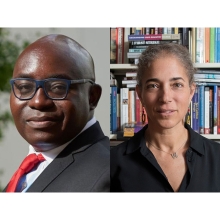Wale Adebanwi and Deborah A. Thomas Named 2024 Guggenheim Fellows

Wale Adebanwi, Presidential Penn Compact Professor of Africana Studies and the director of the Center for Africana Studies, and Deborah A. Thomas, R. Jean Brownlee Professor of Anthropology, have been named 2024 John Simon Guggenheim Memorial Foundation Fellows.
They were among 188 chosen in the United States and Canada from nearly 3,000 applicants working across 52 scholarly disciplines. Now in its 99th year, the fellowship was created in 1925 by Simon and Olga Guggenheim in memory of their son, John Simon. The award is designed to support a project lasting six to 12 months and to allow fellows to pursue independent work at the highest level under “the freest possible conditions,” according to a news release from the John Simon Guggenheim Memorial Foundation.
Adebanwi, who holds a secondary appointment in the Department of Political Science, researches the social mobilization of power in Africa as manifested through ethnicity, nationalism, racial and urban formations, elites, state and civil society, media, intellectual history, and social theory. Adebanwi’s books include Authority Stealing: Anti-Corruption War and Democratic Politics in Post-Military Nigeria, Yorùbá Elites and Ethnic Politics in Nigeria: Obáfémi Awólówò and Corporate Agency, and The Nation as Grand Narrative: The Nigerian Press and the Politics of Meaning. His latest book, How to Become a Big Man in Africa: Subalternity, Elites, and Ethnic Politics in Contemporary Nigeria, will be published in August by Indiana University Press. He is the sole Guggenheim awardee in the category of African Studies.
“Africana studies is the study of humanity,” Adebanwi says. His current project, The Enlightenment in Africa: Newspaper Press and Intellectual Responses to Modernity and Colonialism in Late 19th Century and Early 20th Century Nigeria, will span the U.S., England, and Nigeria to link the history of the Enlightenment to the history of people of African descent.
Thomas, who is also core faculty in Gender, Sexuality and Women’s Studies, has secondary appointments in the Graduate School of Education and the Department of Africana Studies. Her written work includes Political Life in the Wake of the Plantation: Sovereignty, Witnessing, Repair, for which she won the Gordon K. and Sybil Lewis Book Award from the Caribbean Studies Association and the Senior Book Prize from the American Ethnological Society and was runner-up for the Gregory Bateson Prize. Thomas also co-directed and co-produced two films, Bad Friday: Rastafari After Coral Gardens and Four Days in May, both of which explore issues of culture, power, violence, and post-colonialism in Jamaica. Prior to her life as an academic, Thomas was a professional dancer with the New York-based Urban Bush Women, a company committed to using art as a means of addressing issues of social justice and encouraging civic engagement. Thomas is a Guggenheim awardee in the category of Anthropology & Cultural Studies.
During her fellowship year, she will be work on three ongoing projects that integrate creative practice and research. Her new work, Inheritance: A Speculative Ethnography of Evidence, will encompass a eugenics study conducted in 1920s Jamaica; the Ethiopian Zion Coptic church, a branch of Rastafari discovered by white American hippies in the 1960s who plied in the ganja trade to fund the building of a Black kingdom in Jamaica; and Kumina, a Jamaican ritual cultural practice that creates a communion between the living and their spiritual ancestors through drumming, singing, and dancing. The book will address questions of embodied knowledge, the technology of inheritance, and the field of anthropology, Thomas says. “It’s about embodied knowledge, what we think the body tells us, how that knowledge circulates and how that changes over time.”
“Humanity faces some profound existential challenges,” said Edward Hirsch, award-winning poet and president of the John Simon Guggenheim Memorial Foundation. “The Guggenheim Fellowship is a life-changing recognition. It’s a celebrated investment into the lives and careers of distinguished artists, scholars, scientists, writers, and other cultural visionaries who are meeting these challenges head-on and generating new possibilities and pathways across the broader culture as they do so.”





